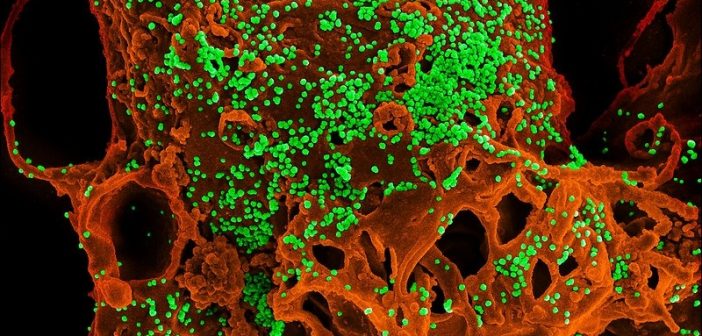Lessons from the onset of the Covid-19 crisis in Greece
March 21, 2020

This is an important report from Takis Georgakopoulos, head of the intensive care unit at the hospital of Patra for many years. Takis was also head of the national organisation of public health prevention policies during the Syriza government.
Starting from Achaia region…
The first case of Covid-19 infection in Greece was identified at the end of February and concerned a young woman from Thessaloniki who had recently traveled to Milan, Italy.
The second case of Covid-19 infection involved a 66-year-old man, who had recently traveled to Israel and Egypt, and firstly visited a private doctor in Amaliada city, then was internated in the local Hospital and then, after worsening symptoms, was transfered to the University Hospital of Patras, as referral Hospital where was diagnosed positive for Covid-19, after a test conducted by the Pasteur Institute in Athens, resulting in the quarantine of several Hospital staff.
The worry in the case of the University Hospital of Patras was that the initial directive of the National Public Health Organization (NPHO-EODY) was not to conduct screening for Covid-19 because the patient had traveled to a country with no reports of Coronovirus infection.
After the affirmative response from the lab, it sounded an alarm both in Patras University Hospital and throughout the healthcare system, as it turned out that in the same group as the first patient, other people had to be checked in, as they had recently a contact with them.
The events unfolded rapidly over the following days as the two Patras Hospitals, the University one and ‘’Saint Andrew’s’’ General Hospital, began to take protective measures for the workers as well as for any people who visited the hospital with possible and/or suspected symptoms of respiratory infection with Covid-19.
The University Hospital, that had been considered a Reference Hospital for the region of Western Greece, opened a special laboratory with considerable delay in mid-March.
However, in both Hospitals the necessary preparations were made to increase the ICU beds, and a special Infections’ department was established for cases where they had to stay in the Hospital without the need for mechanical respiratory support.
What have we learned from these events?
First, the initial handling by the central government bodies was wrong, since they were based on the perception that testing for Covid-19 infection should only be carried out on those who had a recent trip (and possible contact) in a region with established cases.
This notion was based on WHO guidelines and proved to be erroneous and could be dangerous if the WHO did not rapidly change the definition of a suspected Covid-19 case, as well as the pandemic situation.
Second, it seems incomprehensible that the competent state health authorities would not allow the parallel operation of a special control laboratory for Covid-19 at a University Hospital that has been established as a Covid-19 Infection Management Reference Hospital.
During March, 2020, several new cases of Covid-19 infection were reported elsewhere in Greece, as well as new deaths with the same traits as in other countries, which forced the Government to take drastic measures to restrict traffic of people, closing shops and hotels, with the original motto, ” We Stay at Home ”.
This incarceration policy raises a social fear but also has a significant impact on both the human psychology and the financial situation of the country, despite the ” relief measures ” announced by the Mitsotakis Government for those affected by the restriction of trade and business, for as long as the risk of dispersal and contamination with Covid-19 remains.
In this social environment, of course, we observe profiteering phenomena as well as Mitsotakis government’s reluctance to impose sanitary hygienic items such as face masks, antiseptic solutions charged at five times the original price, and at food items that the supermarkets have raised their prices. Mitsotakis government also seems reluctant to protect the employment status of those workers temporarily or permanently losing their jobs because of the socio-economic crisis caused by the Covid-19 pandemic.
Finally, we cannot fail to mention the controversy with the Church over the initial reluctance to stop all worship activities in order to avoid the overcrowding of people, and especially the elderly, in the church space and the ideological confrontation that may exist about Covid-19 contagious by the Holy Communion.
The Church Hierarchy complied with the government’s orders, but the ideological confrontation over whether or not to Covid-19 contagious with the Holly Communion was not clarified, remaining unanswered the question of whether natural or theological interpretation of the potential danger would prevail, in this case.
In Greece of 2020, Covid-19 causes multiple social and economic ”side effects ” that obliged the Mitsotakis government to revise its view on the importance of the Public Health System, which was pre-election obsolete and had a plan to hand it over to private entrepreneurs.
It also tested its overall economic policy against the surplus and debt policy required by the fiscal adjustment commitment.
Internally, however, the governments’ policy, despite major announcements, leaves workers unprotected from the ” tsunami ” of redundancies, promising as an … antidote, financial support of 400 euros (!) to each redundant employee.
This policy of Mitsotakis Government was commented by Alexis Tsipras, President of SYRIZA, saying that “Mitsotakis’ financial support measures are inadequate, as the country with the highest unemployment in Europe provides the least amount of GDP.”
TAKIS GEORGAKOPOULOS
Patras, Greece
March, 20, 2020
